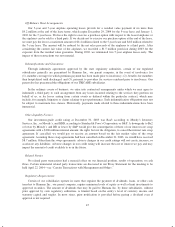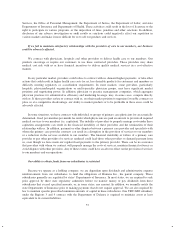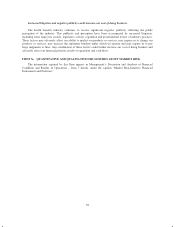Humana 2003 Annual Report Download - page 65
Download and view the complete annual report
Please find page 65 of the 2003 Humana annual report below. You can navigate through the pages in the report by either clicking on the pages listed below, or by using the keyword search tool below to find specific information within the annual report.
Services, the Office of Personnel Management, the Department of Justice, the Department of Labor, and state
Departments of Insurance and Departments of Health. These activities could result in the loss of licensure or the
right to participate in various programs, or the imposition of fines, penalties and other sanctions. In addition,
disclosure of any adverse investigation or audit results or sanctions could negatively affect our reputation in
various markets and make it more difficult for us to sell our products and services.
If we fail to maintain satisfactory relationships with the providers of care to our members, our business
could be adversely affected.
We contract with physicians, hospitals and other providers to deliver health care to our members. Our
products encourage or require our customers to use these contracted providers. These providers may share
medical cost risk with us or have financial incentives to deliver quality medical services in a cost-effective
manner.
In any particular market, providers could refuse to contract with us, demand higher payments, or take other
actions that could result in higher health care costs for us, less desirable products for customers and members or
difficulty meeting regulatory or accreditation requirements. In some markets, some providers, particularly
hospitals, physician/hospital organizations or multi-specialty physician groups, may have significant market
positions and negotiating power. In addition, physician or practice management companies, which aggregate
physician practices for administrative efficiency and marketing leverage, may, in some cases, compete directly
with us. If these providers refuse to contract with us, use their market position to negotiate favorable contracts or
place us at a competitive disadvantage, our ability to market products or to be profitable in those areas could be
adversely affected.
In some situations, we have contracts with individual or groups of primary care physicians for an actuarially
determined, fixed, per-member-per-month fee under which physicians are paid an amount to provide all required
medical services to our members (i.e. capitation). The inability of providers to properly manage costs under these
capitation arrangements can result in the financial instability of these providers and the termination of their
relationship with us. In addition, payment or other disputes between a primary care provider and specialists with
whom the primary care provider contracts can result in a disruption in the provision of services to our members
or a reduction in the services available to our members. The financial instability or failure of a primary care
provider to pay other providers for services rendered could lead those other providers to demand payment from
us, even though we have made our regular fixed payments to the primary provider. There can be no assurance
that providers with whom we contract will properly manage the costs of services, maintain financial solvency or
avoid disputes with other providers. Any of these events could have an adverse effect on the provision of services
to our members and our operations.
Our ability to obtain funds from our subsidiaries is restricted.
Because we operate as a holding company, we are dependent upon dividends and administrative expense
reimbursements from our subsidiaries to fund the obligations of Humana Inc., the parent company. These
subsidiaries generally are regulated by states’ Departments of Insurance. In most states, we are required to seek
prior approval by these state regulatory authorities before we transfer money or pay dividends from these
subsidiaries that exceed specified amounts, or, in some states, any amount. In addition, we normally notify the
state Departments of Insurance prior to making payments that do not require approval. We are also required by
law to maintain specific prescribed minimum amounts of capital in these subsidiaries. One TRICARE subsidiary
under the Regions 3 and 4 contract with the Department of Defense is required to maintain assets at least
equivalent to its current liabilities.
57
























